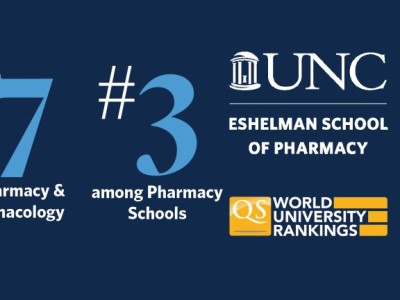June 12, 2020
The Eshelman Institute for Innovation (EII) is pleased to announce the recipients of its 2020 grant cycle. A total of $1.3M will be granted to the below six projects:
Center for Integrative Chemical Biology and Drug Discovery
Metarrestin Derivatives as Selective Anti-Cancer Agents with Reduced CNS Exposure
Co-PI: Sui Huang, Associate Professor of Cell and Developmental Biology, Northwestern University
Metastatic cancer remains an urgent, unmet medical need and, while numerous treatment options are available for many cancer patients, those with metastatic diseases have limited options. We developed metarrestin, a first-in-class anti-metastasis drug that recently began phase I human clinical trials at NCI. In this work, we will develop next generation derivatives that more effectively target metastasis including a subset designed with restricted CNS penetration to reduce neurological side effects possible at high doses.
Division of Chemical Biology and Medicinal Chemistry
Novel Bioorthogonal Chemical Epigenetic Modifier Development
Co-PI: Lindsey James, Assistant Professor, Division of Chemical Biology and Medicinal Chemistry
This project will generate and test novel bifunctional chemicals that will be used in combination with CRISPR targeting systems to relocate epigenetic regulators to genes resulting in enhanced transcriptional expression. We will apply this new technology to examine the therapeutic potential in rare human diseases driven by single gene dysregulation events such as the neuromuscular disease Friedreich’s Ataxia.
Division of Pharmacoengineering and Molecular Pharmaceutics
Ubercell Technology: Programmable Peptide-Cell Therapy Vehicles
Co- PI: Ronit Freeman, Associate Professor, UNC Department of Applied Physical Sciences
Glioblastoma (GBM) is a devastating brain cancer that often relapses because therapy-resistant cancer cells infiltrate the body at the tumor’s margin. A new partnership between Shawn Higntgen and Ronit Freeman will combine tumor-homing cells and peptide scaffolds into a game-changing approach that seeks out GBM cells and deliver combinations of anti-cancer therapies from small molecules to CAR-T cells. This will create a cell therapy like no other with enhanced tumor recognition while avoiding off-target effects.
Division of Chemical Biology and Medicinal Chemistry
Development of Novel Therapeutics for Multiple Myeloma
This project aims to develop potent ligands for a novel target recently identified as a crucial mediator of tumorigenicity and novel therapeutic target in multiple myeloma (MM). Newly developed ligands will be used to evaluate the effects of target inhibition on tumorigenicity in MM model systems and explored as potential therapeutics for the treatment of MM.
Division of Chemical Biology and Medicinal Chemistry
A Pro-STING Agonist that is Activated in the Tumor Microenvironment
This project aims to develop a pro-gene that is self-cleaved and silenced in normal cells but enzymatically processed and expressed in the tumor microenvironment, resulting in a therapeutic protein product that can activate the innate immune responses such as STING signaling for the combination treatment of hepatocellular carcinoma without affecting normal tissues. The technology platform developed in this project could be widely used in other gene therapy approaches.
Division of Pharmacoengineering and Molecular Pharmaceutics
Highly Loaded Exosomes as Cell-free Therapeutics for Tissue Regeneration and Repair
Co-PI: Li Qian, Associate Professor, Department of Pathology and Laboratory Medicine
Myocardial infarction and ischemic heart diseases remain the leading cause of death worldwide. While current treatment approaches have significantly decreased mortality from myocardial infarction, those who survive the acute event continue to be at high risk of arrhythmias, strokes, and congestive heart failure. Infarction kills millions of cardiomyocytes, and residual cardiomyocytes have only limited ability to proliferate. Thus, there is an urgent need for new and effective approaches capable of regenerating the infarcted myocardium. The overall goal of this project is to develop a cell-free therapeutic capable of repairing and regenerating injured tissues. We will apply cutting-edge engineering strategies to synthesize safe and highly effective exosomes that can be used as cell-free therapeutics for cardiac tissue regeneration and other chronic wounds.
The EII implemented a new grant process for the 2020 grant cycle with a new focus on projects that have a clear market opportunity and scientific novelty. This year’s grant cycle included a rigorous proposal and review process, which involved recipients submitting both a pre-proposal and a full proposal to the EII. All proposals were reviewed by several scientific reviewers and the EII Steering Board before being selected for funding.
In addition to the yearly grant cycle, the EII offers a year-round opportunistic grant cycle for faculty projects that are time-sensitive. More information on the EII Opportunistic Grant can be found here.
For additional information about the EII’s reach, view the EII’s 2019 Impact Report.
Latest News

Delesha Carpenter promoted to full professor

Developing new ways to treat heart attacks without surgery








